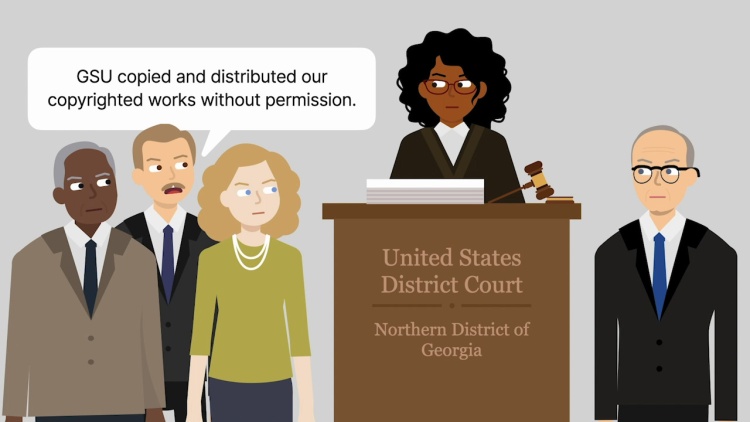Cambridge University Press v. Patton
United States Court of Appeals for the Eleventh Circuit
769 F.3d 1232 (2014)

- Written by Cynthia (Anderson) Beeler, JD
Facts
The Board of Regents of the University System of Georgia (the board) (defendant) and administrators at Georgia State University (GSU) (defendant) implemented a policy for determining whether distributing excerpts of copyrighted works, such as textbooks, to students would constitute fair use. The policy was used to determine whether digital copies could be made available to students free of charge. Under the policy, professors were required to use a checklist of factors to consider under each of the statutory fair-use factors. Cambridge University Press, Oxford University Press, and Sage Publications, Inc. (collectively, the publishers) (plaintiffs) published academic textbooks. The publishers, through the Copyright Clearance Center, enabled users to license the use of portions of some textbooks, either electronically or by making photocopies. There were significantly more books that allowed for the licensing of photocopies than for digital copies. Only some titles had digital licensing available. In 2009, less than 1 percent of revenues for the publishers came from licensing excerpts of the books. The publishers sued the board and GSU for copyright infringement. The district court determined that there was an issue as to whether fair use applied for 78 claims of infringement, but only conducted individual analyses for the fair-use factors for seven claims. The court decided the remaining 71 claims based on a mechanical approach applying generalized determinations for each of the four factors. The publishers appealed.
Rule of Law
Issue
Holding and Reasoning (Tjoflat, J.)
Concurrence (Vinson, J.)
What to do next…
Here's why 907,000 law students have relied on our case briefs:
- Written by law professors and practitioners, not other law students. 47,100 briefs, keyed to 996 casebooks. Top-notch customer support.
- The right amount of information, includes the facts, issues, rule of law, holding and reasoning, and any concurrences and dissents.
- Access in your classes, works on your mobile and tablet. Massive library of related video lessons and high quality multiple-choice questions.
- Easy to use, uniform format for every case brief. Written in plain English, not in legalese. Our briefs summarize and simplify; they don’t just repeat the court’s language.





